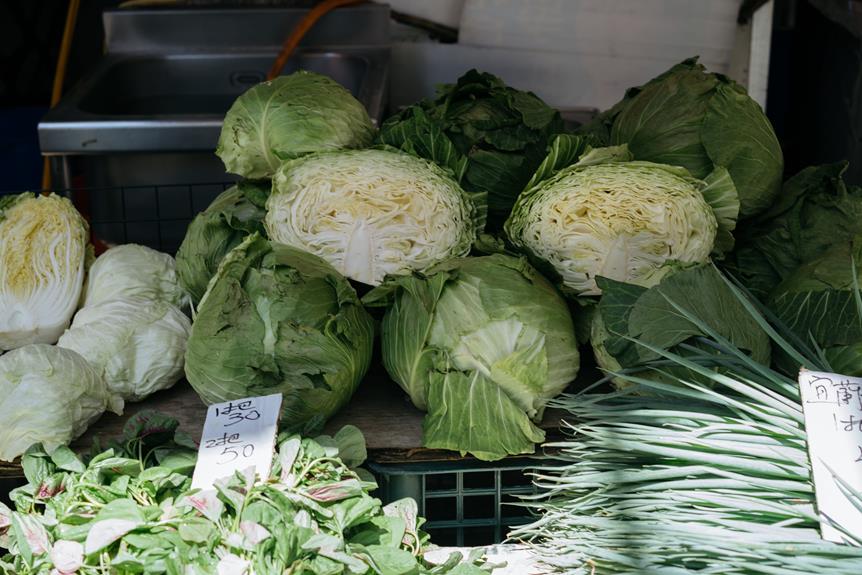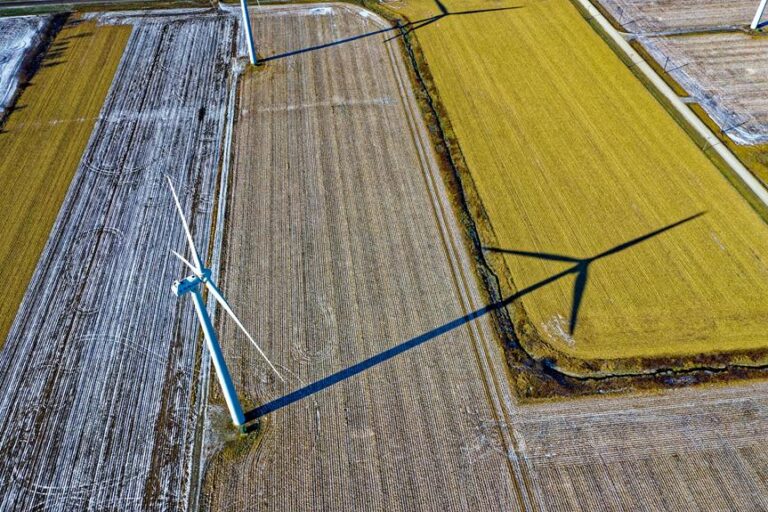Sustainable Living Made Easy: Benefits of Organic Farming
Are you tired of the harmful chemicals and practices used in traditional farming? We sure were! That’s why we’re excited to share with you our 11 benefits of organic farming for sustainable living.
With increased soil fertility, reduced chemical exposure, and preservation of biodiversity, organic farming is a sustainable way to live. Plus, it’s not just good for the environment, but also for your health.
Join us on this journey towards a better, healthier future through organic farming.
Increased Soil Fertility
One of the key benefits of organic farming is that it improves soil fertility over time. By avoiding the use of synthetic fertilizers and pesticides, organic farmers rely on natural methods to nourish the soil and promote the growth of healthy crops. This approach not only benefits the environment but also leads to improved crop yields.
Organic farming techniques, such as composting and crop rotation, help replenish essential nutrients in the soil, ensuring that it remains fertile for future plantings. Additionally, organic pest control methods, like the use of beneficial insects and natural repellents, help maintain a balanced ecosystem, further contributing to soil fertility.
With organic farming, we can cultivate thriving soil that supports sustainable agriculture and provides us with nourishing, high-quality produce.
Reduced Chemical Exposure
By choosing organic farming, we can minimize our exposure to harmful chemicals and create a safer environment for ourselves and future generations.
One of the main benefits of organic farming is the reduced pesticide usage. Conventionally grown crops are often treated with a wide range of chemical pesticides to protect them from pests and diseases. However, these pesticides can have detrimental effects on human health.
Studies have shown that long-term exposure to pesticides can lead to various health issues, including respiratory problems, reproductive disorders, and even certain types of cancer.
Preservation of Biodiversity
To promote the preservation of biodiversity, we can actively support organic farming practices.
Organic farming methods prioritize the preservation of natural habitats and the promotion of ecological balance. Unlike conventional farming, which relies heavily on chemical inputs and monoculture practices, organic farming seeks to work with nature rather than against it.
By avoiding synthetic pesticides and fertilizers, organic farmers create a healthier ecosystem for plants, animals, and insects to thrive. They also use crop rotation and cover cropping techniques to enhance soil fertility and prevent soil erosion, which helps protect the habitats of various organisms.
Additionally, organic farmers encourage biodiversity by providing habitats for beneficial insects, birds, and other wildlife.
Conservation of Water Resources
Water conservation is a crucial aspect of sustainable farming. By implementing water-saving irrigation techniques, such as drip irrigation or micro-sprinklers, organic farmers can minimize water wastage and ensure that plants receive the right amount of water.
Additionally, rainwater harvesting methods, such as using rain barrels or constructing ponds, can help capture and store rainwater for later use on the farm, reducing reliance on freshwater sources.
Water-Saving Irrigation Techniques
Implementing efficient irrigation methods is essential for conserving water resources in organic farming. Two effective techniques for water-saving irrigation are drip irrigation systems and mulching.
Drip irrigation systems deliver water directly to the plant roots, reducing water waste through evaporation and runoff. This method also allows for precise control over the amount of water each plant receives, ensuring optimal hydration while minimizing water usage.
Mulching, on the other hand, involves covering the soil with a layer of organic materials like straw, leaves, or wood chips. This helps retain soil moisture by reducing evaporation, preventing weed growth, and protecting the soil from extreme temperature fluctuations.
Rainwater Harvesting Methods
One effective method for conserving water resources in organic farming is by utilizing rainwater harvesting techniques. Rainwater harvesting is the process of collecting and storing rainwater for later use. This method not only helps to reduce water consumption from other sources but also promotes sustainable farming practices.
There are several methods of rainwater harvesting that can be implemented on organic farms. One method is the use of alternative materials for rainwater collection. Instead of using traditional concrete or plastic tanks, organic farmers can opt for sustainable design options such as bamboo or recycled plastic containers. These materials aren’t only environmentally friendly but also cost-effective and durable.
Another method is the implementation of sustainable design features for rainwater collection. This includes the use of rain barrels or cisterns to collect and store rainwater. These containers can be placed strategically around the farm to capture runoff from rooftops, gutters, and other structures. This water can then be used for irrigation, livestock watering, or other farming needs.
Enhanced Nutritional Value
When it comes to organic farming, one of the key benefits is the enhanced nutritional value of the crops. Organic farms prioritize soil health and fertility, resulting in nutrient-rich produce that’s packed with vitamins, minerals, and antioxidants.
Nutrient-Rich Crops
We have found that growing nutrient-rich crops through organic farming methods is an effective way to enhance the nutritional value of our harvest. By focusing on organic farming techniques, we’re able to cultivate nutrient-dense produce that’s packed with essential vitamins and minerals.
Here are three reasons why nutrient-rich crops are beneficial for sustainable living:
- Improved Health: Consuming nutrient-rich crops provides our bodies with the necessary nutrients to support overall health and wellbeing. These crops are free from harmful pesticides and chemical fertilizers, making them a healthier choice for our families.
- Enhanced Flavor: Nutrient-rich crops tend to have a more vibrant and intense flavor compared to conventionally grown produce. This is due to the natural and organic methods used in their cultivation, which allow the crops to develop their full taste potential.
- Environmental Sustainability: Organic farming techniques promote biodiversity, reduce soil erosion, and conserve water resources. By growing nutrient-rich crops organically, we aren’t only nourishing our bodies but also contributing to the preservation and sustainability of our environment.
Incorporating nutrient-rich crops into our diet is a simple yet powerful way to improve our overall health while supporting sustainable living.
Healthier Food Options
Growing nutrient-rich crops through organic farming methods allows us to provide healthier food options with enhanced nutritional value. Organic farming practices prioritize the use of natural fertilizers and pesticides, resulting in produce that’s free from harmful chemical residues. This ensures food safety and reduces the risk of health issues associated with pesticide exposure.
Additionally, organic certification guarantees that the food has been grown without the use of genetically modified organisms (GMOs), antibiotics, or synthetic hormones. This means that organic fruits, vegetables, and grains aren’t only packed with essential vitamins, minerals, and antioxidants, but they’re also free from potentially harmful substances.
Support for Local Communities
Organic farming actively promotes the economic growth and resilience of local communities. By prioritizing the use of local resources and engaging with community members, organic farmers create a positive impact on the local economy and foster a sense of belonging within the community. Here are three ways organic farming supports local communities:
- Support for local economies: Organic farmers often source their materials locally, which boosts the local economy by supporting local businesses and suppliers. Additionally, organic farms create jobs within the community, providing employment opportunities and contributing to the overall economic growth.
- Community engagement: Organic farmers actively engage with their local communities through farmers markets, community-supported agriculture (CSA) programs, and educational initiatives. This not only strengthens community bonds but also enables individuals to connect with the source of their food, fostering a sense of pride and ownership in their community.
- Environmental stewardship: Organic farming practices prioritize sustainability and conservation. By choosing organic products, consumers support farmers who are committed to preserving the environment for future generations. This shared commitment to environmental stewardship creates a sense of unity and purpose within the community.
Through support for local economies, community engagement, and environmental stewardship, organic farming plays a vital role in building resilient and thriving local communities. By choosing organic products and supporting local farmers, individuals can actively contribute to the growth and well-being of their communities.
Reduced Carbon Footprint
Reduced carbon footprint is one of the key benefits of organic farming. By adopting sustainable practices, organic farmers contribute to environmental sustainability by minimizing the release of greenhouse gases into the atmosphere.
This not only helps in mitigating climate change but also promotes a healthier and more sustainable future for all of us.
Environmental Sustainability Benefits
One of the key benefits of organic farming for sustainable living is the significant decrease in carbon emissions. Organic farming practices prioritize environmental stewardship and promote sustainable agriculture.
Here are three ways organic farming helps reduce our carbon footprint:
- Soil Management: Organic farmers focus on building healthy soil through practices like crop rotation, composting, and cover cropping. These methods increase soil organic matter, which helps sequester carbon from the atmosphere.
- Reduced Chemical Inputs: Organic farming avoids the use of synthetic fertilizers and pesticides, which contribute to greenhouse gas emissions during production and application. By using natural alternatives, organic farmers reduce their carbon footprint.
- Preservation of Biodiversity: Organic farms support diverse ecosystems by avoiding genetically modified organisms and promoting wildlife habitats. This preservation of biodiversity helps maintain the balance in the environment and reduces carbon emissions associated with monocultures.
Lower Greenhouse Gas Emissions
To further support sustainable living, organic farming practices significantly contribute to lowering greenhouse gas emissions. By implementing sustainable farming techniques, organic farmers can greatly reduce the amount of greenhouse gases released into the atmosphere.
One of the main ways this is achieved is through the avoidance of synthetic fertilizers and pesticides, which are known to contribute to greenhouse gas emissions. Instead, organic farmers rely on natural methods such as composting and crop rotation to nourish the soil and control pests.
Additionally, organic farming promotes the use of cover crops, which absorb carbon dioxide from the air and help sequester it in the soil. These practices not only reduce greenhouse gas emissions, but also help to mitigate climate change and preserve the health of our planet.
Climate Change Mitigation
Implementing organic farming practices is crucial for mitigating climate change and reducing our carbon footprint. Here are three ways organic farming contributes to climate change mitigation:
- Carbon sequestration: Organic farming methods, such as cover cropping and crop rotation, enhance soil health and increase carbon sequestration. Healthy soils act as carbon sinks, absorbing and storing carbon dioxide from the atmosphere.
- Reduced chemical inputs: Organic farming avoids the use of synthetic fertilizers and pesticides, which are energy-intensive to produce and release greenhouse gases during manufacturing. By minimizing chemical inputs, organic farming helps reduce carbon emissions.
- Renewable energy use: Organic farms often prioritize the use of renewable energy sources, such as solar panels or wind turbines, to power their operations. By relying on clean energy, organic farmers further reduce their carbon footprint and contribute to a more sustainable future.
Promotion of Healthy Ecosystems
Organic farming practices actively support and enhance the health of ecosystems. By adopting healthy farming practices, such as avoiding synthetic chemicals and genetically modified organisms, organic farmers contribute to sustainable agriculture.
Unlike conventional farming methods that rely heavily on chemical inputs, organic farming focuses on promoting biodiversity and soil health. This approach helps to maintain a balance in the ecosystem, benefiting not only the crops but also the surrounding wildlife.
Organic farmers prioritize soil conservation and use techniques like crop rotation and cover cropping to improve soil structure, reduce erosion, and enhance water retention. By avoiding the use of synthetic pesticides and fertilizers, organic farming reduces pollution and protects the health of pollinators and other beneficial organisms.
Embracing organic farming practices is a vital step towards building healthy and resilient ecosystems for a sustainable future.
Protection of Wildlife Habitats
By prioritizing the protection of wildlife habitats, organic farming practices actively contribute to the preservation of biodiversity and the overall health of ecosystems. Here are three ways in which organic farming promotes wildlife conservation and ecosystem protection:
Preservation of Natural Habitats:
Organic farmers avoid the use of synthetic pesticides and chemicals that can harm wildlife and their habitats. By using natural methods like crop rotation and companion planting, organic farmers create a more sustainable environment for animals, birds, and beneficial insects.
Reduction of Pollution:
Organic farming practices minimize the use of synthetic fertilizers and pesticides, reducing pollution in soil, water, and air. This helps to maintain the balance of ecosystems and protects wildlife from harmful effects.
Promotion of Biodiversity:
Organic farms often feature a variety of crops and vegetation, providing a diverse range of habitats for different species. This biodiversity supports wildlife populations by offering food sources, shelter, and nesting areas.
Through these practices, organic farming plays a crucial role in safeguarding wildlife habitats and maintaining the delicate balance of our ecosystems.
Contribution to Climate Change Mitigation
To further address the benefits of organic farming for sustainable living, let’s now explore its significant contribution to mitigating climate change.
Organic farming plays a crucial role in reducing greenhouse gas emissions and promoting carbon sequestration. Unlike conventional farming methods, organic farming practices minimize the use of synthetic fertilizers and pesticides, which are major contributors to greenhouse gas emissions. Additionally, organic farming promotes the use of renewable energy sources such as solar and wind power, reducing reliance on fossil fuels.
By adopting organic farming techniques, farmers can enhance soil health, thereby increasing carbon sequestration. This process involves capturing and storing carbon dioxide from the atmosphere in the soil, effectively reducing its concentration and mitigating climate change.
Conclusion
Organic farming offers a multitude of benefits for sustainable living. From increased soil fertility to reduced chemical exposure, it’s clear that this method isn’t only practical but also essential for our future.
But that’s not all. By promoting healthy ecosystems and protecting wildlife habitats, organic farming contributes to climate change mitigation.
So, if you’re looking to make a positive impact and live a more sustainable lifestyle, consider embracing organic farming. The possibilities are endless, and the rewards are yet to be unveiled…







7 Comments
Comments are closed.